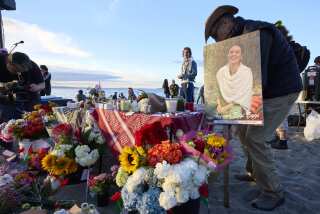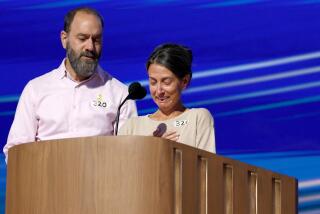Fears From Afar : Arab women in the U.S. cling to each other as they try to make sense of the war in the Gulf. They find themselves caught between their homelands and their adopted country.
Hanan El-Farra’s sister lives in Kuwait with her husband and four little girls. She also has family in Iraq and in the West Bank.
“About a week ago, I wanted to kill myself,” said the Palestinian-born American, who has had “broken nerves” since the Persian Gulf War began. “I was driving my car like a crazy (person), talking to myself, afraid to speak on the phone because of the FBI.”
However, she found the strength to tell herself, “OK. We have to live our lives. We have to do something.”
So she decided to invite Arab women sharing similar worries to her Los Feliz-area home. They had been offering each other support over the phone, but it was not enough. She invited them to meet with Ilham Al-Sarraf, a licensed marriage, family and child counselor in Glendale, who is also an Iraqi with family in Baghdad.
But last Wednesday morning--the day the group was to meet--massive civilian casualties were reported in the bombing of a structure in the Amariya district of Baghdad. Al-Sarraf, who also has been distraught since the war began, called El-Farra to say she could not go through with the meeting. Amariya is where her parents, brothers and sisters, nieces and nephews live. She did not know of their fate.
But by late morning, her face tear-stained and swollen, Al-Sarraf was sitting among about 30 women in El-Farra’s living room, telling them there was no better place to be.
“I feel enraged. I have nowhere to take my anger,” she said--her voice breaking--to the women, among them Egyptians, Saudis, Palestinians, Lebanese, Iraqis, Jordanians and Syrians. They watched her silently, several weeping along with her.
Wavering between professionalism and raw emotion, Al-Sarraf urged the women to express their feelings and fears.
They did not hesitate.
They described rage at what was being done to Arabs: of women and children being dehumanized with phrases like “collateral damage”; of the double standard they say Americans use to measure Arabs and Israelis; of ambivalence about their own feelings towards the war and Saddam Hussein; of dual loyalties as Americans and Arabs; of being hurt by “Nuke Iraq” bumper stickers and T-shirts; of perplexity and worry as mothers.
They are living in a climate where trying to separate politics from their emotions and personal lives is an artificial exercise at best.
“Forget Bush, forget Saddam,” a Palestinian cried out halfway through an impassioned description of her confusion and turmoil. She had become impatient with the political rhetoric she was hearing.
“I’m not dealing with butchers,” said the woman, who like many in the room, did not want her name used. “I do not want to speak trash. Politics is trash. I want to talk about women and children. This war is killing me with two weapons--back home and right here with my children.”
She has a draft-age son and two young daughters. She worried about the confusion her children are feeling with divided loyalties, and of how she dealt with them.
Her 10-year-old daughter had come to her upset about the 11 coffins of Americans coming home. The little girl wanted to put the American flag out.
Rather than comfort her daughter, the woman said she cried.
“I’m ashamed,” her daughter told her. “I don’t feel I’m Arab. I’m American.”
“ ‘You should be proud of it,’ I told her,” but, still unsettled, she appealed to the group with her dilemma: “My kids are American but their heritage is Arab.”
The others talked about their children, too. Most of the women are naturalized American citizens. One has been in the United States for as long as 25 years, others arrived more recently.
One told how her 17-year-old daughter had heard a military man speak about the war at her school. She came home confused, then found fault with her mother’s point of view, calling her too emotionally involved. Her daughter had withdrawn from her, and the war itself, refusing to watch anything on television.
“How do I deal with it?” she asked helplessly.
“When there’s a lot of confusion, shedding it off is a way the body can cope,” Al-Sarraf told her. “It’s important to give her the freedom to pull away. She’ll come around. She has to come to her own conclusion without your influence. But you can give her the love and support and freedom to make her mind up.”
The same woman was perplexed with yellow ribbons as a sign of U.S. troop support. How could she honor her child’s request and put one on her car?
“ ‘Why do you want to support troops to kill our people?’ I asked her. I’m not sure I handled it well. I do support our troops--to come back here safely.”
Al-Sarraf urged them to watch the news with their children, to reassure them that nothing would happen to them, to show them Iraq and California on a map and explain the distance. She told of a man who feared Scud missiles would find him in his house in Encino. “Can you imagine how that fear is internalized in their little bodies?”
She said frightened schoolchildren are returning to households where the mother has watched CNN all day, the father is angry and distracted, and the child is too petrified to say, “I hurt.”
“We need a hot line (with each other),” she said, so that a child can call someone and say, “Please, auntie, can I talk to you? My mom is upset.”
Another woman in the group wanted to know: “How do we explain to people who tell us we (Arabs) are fighting brother against brother?
“The Arab people do not have representative governments. The fight is not between you and me. We are very integrated. . . . The United States chooses to support dictators throughout Arab countries.”
Always they came back to the attitude and treatment of Arabs by the United States.
“I feel like America has two children. One is abused and one is spoiled rotten. The abused one is the Arab people. The spoiled one is Israel. We would like to be spoiled just once,” said Lena Aryan, a Palestinian who has been here for 25 years.
“As Arab-American women we have a lot to say to American women,” one said, suggesting they contact national women’s organizations. “We need to address them, explain to them the circumstances that led to this war. Whatever they are sending their sons and daughters to be killed for, it is not to defend America.”
Another called across the room, “Talk to your American friends. Get their sympathy. It’s important not to seal ourselves off.”
“We need to express the fact we are also human beings,” said Susan Hawal, an American originally from Jordan, who chaired the meeting. “We do feel, we do hurt, we do cry when our husbands go to war.”
The women talked of their mother countries and their adopted country and there seemed to be consensus that they had chosen America for the freedom here. And yet, Al-Sarraf observed, many seemed to be in a state of lingering fear from life in their former countries, afraid to use their freedom of speech, afraid to speak up. She urged them to change that, to call the White House, meet their representatives, phone the talk shows.
When the women broke for lunch, Al-Sarraf--who had held up throughout the meeting--gave way to her sorrow, heading for a couch in the den, sitting there bent over and sobbing while others came to her side.
That afternoon women stayed behind and formed three committees--for a blood drive, for financial aid and medicines, and for communication with the general public. They plan to meet weekly.
However, an earlier suggestion asking CNN and the Red Cross to jointly help the Iraqis here get information about people in Baghdad was rejected. Such interference from American organizations would only bring their Iraqi relatives deep trouble from Saddam Hussein because they would be accused of being American agents, said an Iraqi woman.
Throughout the meeting, President Bush’s name was frequently invoked, never without fury and accusation. Yet, on the mantle over the fireplace stands a signed, framed photograph of El-Farra’s husband, Mahmoud--a local businessman--standing with George and Barbara Bush.
Looking over her shoulder at it, a look of weary irony passed over Hanan El-Farra’s face.
“I know,” she said, shaking her head and exhaling through her teeth. “I elected him. What can you do?”
More to Read
Sign up for Essential California
The most important California stories and recommendations in your inbox every morning.
You may occasionally receive promotional content from the Los Angeles Times.










